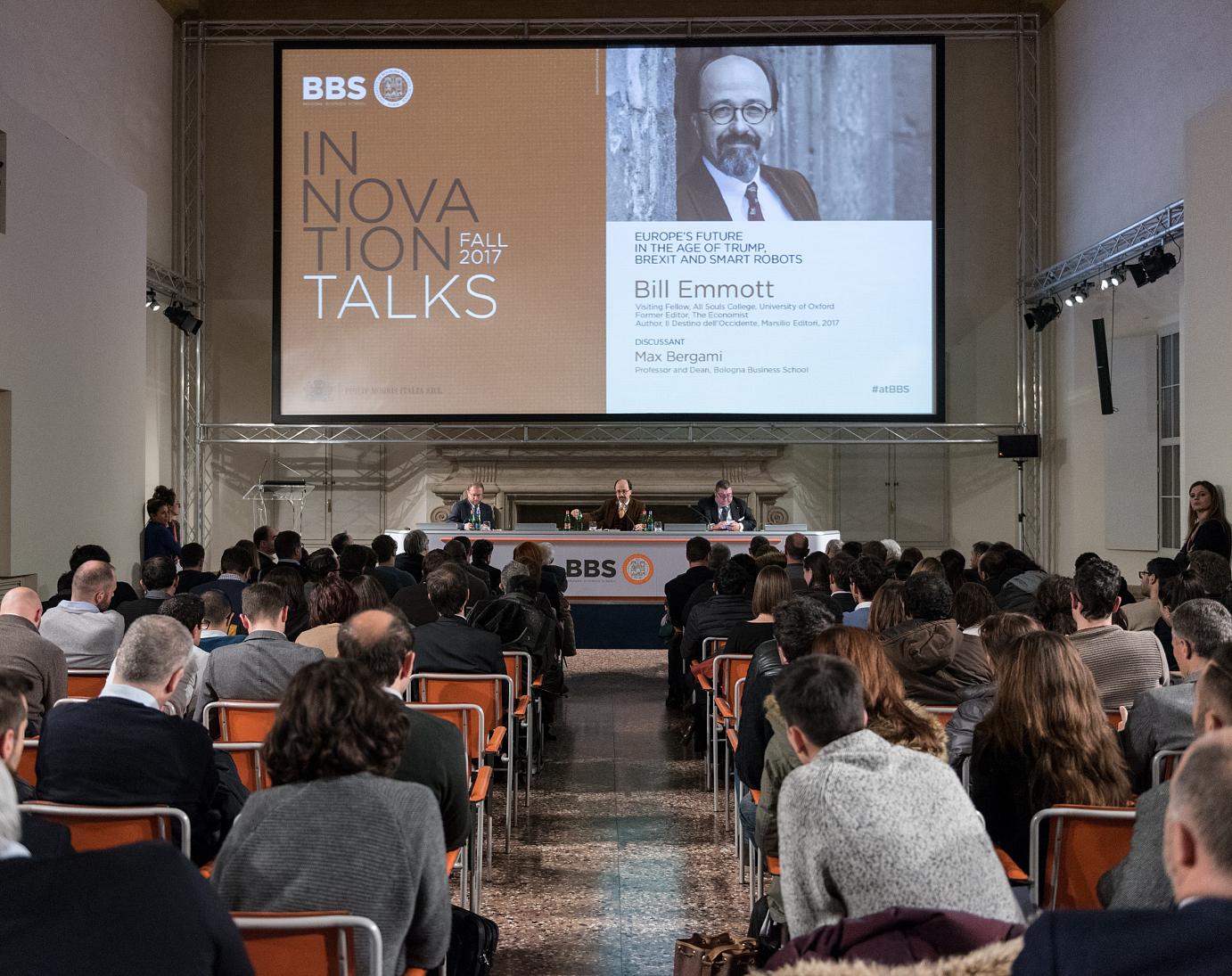
Innovation Talks: the future of the West and of the Religions
22 December 2017Bologna Business School concludes the year 2017 with two in-depth reflections on the future of Western societies and on their political, spiritual and economic development. The last two appointments with the Innovation Talks of the Fall edition have touched on topical issues with the British journalist and writer Bill Emmott and Professor Marco Ventura, our guests on December 15 and 19.
The fate of the West, how to save the best political idea of history, is the provocative title of the last book by Bill Emmott, published in Italy by Marsilio Editore. According to the author, the perfect balance between openness, liberalism and fairness has generated more stability and prosperity than any other system in history. The provocation of his work lies in the question he poses to himself and to the public: is everything that we have built really under threat?
If openness and equality are the constituent elements of the idea of the West, how is it explained that a large part of our open society prefers to return to isolation, supporting separatist movements and closure policies such as the Le Pen’s Front National and Trump’s America First? The key to reading the major social and political events of the last decade is to be found, according to Bill Emmott, in the 2008 economic crisis and its consequences. When these reached the peripheral and rural areas, already disadvantaged from an employment and income point of view, the population has turned against globalization and its symbol: the capital. This is not a real preference given to political alternatives, but a strong aversion to the present situation and a sign of the evident idealization of the past.
The status quo to be undermined at any cost, often to the detriment of liberties, is in some ways also the central theme of Brexit. In March 2017, BBS hosted the British ambassador Jill Morris, who defined Brexit as a choice that could not be undone. “The exit from the European Union in itself does not bother me. What is causing uncertainty at the moment is the lack of destination for my country,” adds Emmott.
If on the one hand we see political institutions fail one after the other in responding to the expectations of the population, religious communities remain firmly in place as the main providers of welfare services, independently or in collaboration with public bodies. In the United States alone, faith communities and congregations contribute 1.2 trillion dollars to the country’s economy, representing more than the revenue of the 10 largest Tech companies put together, including Apple, Google and Amazon.
Marco Ventura, Professor of Law and Religion at the University of Siena, and Director of the Center for Religious Studies at the Fondazione Bruno Kessler, shared with us his thoughts on the emerging role of faiths and beliefs in development and growth. The socio-economic impact of the congregations and their programs in support of the weakest is indisputable. In the United States 344.00 congregations create and implement 1.5 million support programs with the help of 7.5 million volunteers. Numbers that states would struggle to achieve on their own, even more so in current economic conditions.
The real challenge, which equally affects both the business world and the faith communities, concerns overcoming the collision between freedom of enterprise and religious freedom. According to Ventura, it is necessary to rethink faith and religious conviction as a central asset to the brand and to the identity of companies, making a multi-religious work environment not an obstacle, but a resource for companies. Furthermore, there are countless opportunities for professionals to contribute managerial skills and business strategies to religious communities in the management of their activities. Considering the vast impact of their work, collaboration with the public authorities is desirable in order to define public policies oriented to the Sustainable Development Goals (SDGs).
According to Ventura, religions have the possibility and the need to evolve and leave behind them the most violent connotations linked to their sacred texts or history. The future and the innovation of religions are to be found in a responsible cooperation between the business sector and the faith communities, following a common social development that reinforces the foundations on which the different cultures and traditions are based.
One of the central themes of the Innovation Talks was also the technological innovation and the unstoppable development of the digital sector. In a sense, scientific and technological discoveries seem to be the only ideas that really manage to overcome boundaries: physical, intellectual, political and religious. The Internet, for example, is the emblematic case of a supranational structure which, with due pros and cons, manages to unify the interests and potentials of the world around itself. Probably, technological advancement will preserve part of the distance between the rich and the poor of the planet, but it will remain an extraordinary instrument of unification, because it transfers with great speed, giving also the lower social classes and weaker geographical areas the opportunity to improve their conditions.
What we have call ‘the crisis‘ for more than ten years now, is only partly linked to the economic aspects of our lives. We have been encouraged to believe that this is also a crisis of values, moral and ethics. Regardless of whether we are in agreement with this position or not, it is important to be able to look at the tenacious search for transformation and innovation even in the most unusual areas. It is from the challenges and difficulties that real opportunities arise.
